A meditation on divine providence.
So I’ve had this . . . problem. For the last six months, I’ve seen about 5+ owls per day in the form of graphics, illustrations, stuffed animals, real owls, and more. I know owls are having a moment in our culture right now (my husband sent me this article about it), but they’ve had a particularly deep significance for me. It started in the early fall last year when my husband first started to apply for jobs which would launch his career after this his final year of grad school. Whenever I’m on the cusp of some major life change, I start to look for signs of God’s Will so that I know which way to go. The reason I do this is because is it what I became accustomed to in my new life which began after my reversion in 2003. It felt like a personal bargain that God and I had struck when I committed myself to His service: I’ll work for You if You make things easy and peaceful and fun. Deal. So for the first decade of my life of faith, God was always raining consolations upon me. I have dozens of stories of His Providence arriving clearly and boldly just in the nick of time. If I wrote them all down, you would surely say it was all made up (I shared one of them in the epilogue of my Groundhog Day post). I felt very blessed to have God so clearly on my team at all times.
Thus, when I started noticing owl paraphernalia everywhere, I immediately tried to figure out what it meant. One day when I took my kids to the zoo, my 4-year-old decided that he wanted to see the owl first and I was surprised because the thing has never, ever been awake in the hundred or so times we’ve gone to that zoo. "Yeeeeeah, owls are nocTURnal," my son would explain to the disappointed on-looking children who were hooting at it to try to wake it up. But this time, we went straight to the owl and its eyes were wide open, staring at me. I was so struck by this that I got as close as I’ll ever get to the Inferno‘s circle of diviners and leaned in to ask the owl, "What do you want? What am I to do?" That was pretty confusing to my kids, as you can imagine. It didn’t talk to me, but when I was home that evening doing a little research on the universities to which my husband had applied I discovered that the mascot of one of the places is an owl. All at once I was convinced that that is where we are going and that God is trying to prepare me in His gentle and weird way because—wow—I really don’t want to go there.
Let me give you a little taste of what this time has been like with a synopsis of one day-in-the-life-of-a-crazy-person: I woke up in the morning and went to the kitchen to prepare the baby’s oatmeal and applesauce and pulled out a jar with this on it:
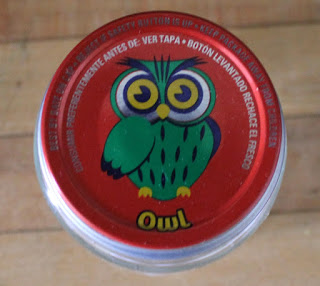
Then, I found the Winnie-the-Pooh book open on the floor of the nursery with this page open:
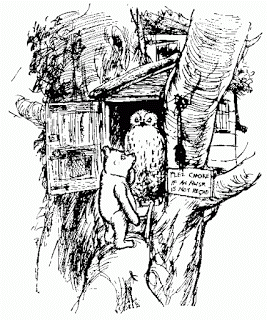
Next, I drove my son to school and the back of the car in front of me had this decal:

Then I took the baby for his well-check at the pediatrician and the bin of stickers at reception is filled with hundreds of Sponge Bob and Scooby Doo stickers which are facing down and the one sticker on top facing up is this:
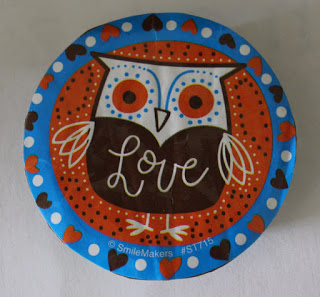
Went home, put the baby down for his nap, and the thing at the very top of my Facebook feed was this:
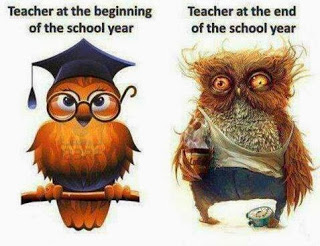
I pick up my son from school and he shows me that the only art work he did all day was this:
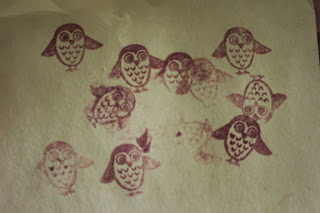
Finally I went out in the evening to meet a friend at Barnes and Noble and adjacent to her head was this: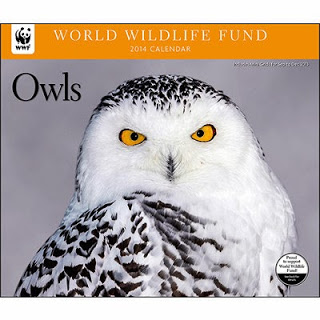
All in just one day, people. Wouldn’t you be freaking out?! It got to the point where I needed some form of spiritual direction for this thing. A friend of mine who is much like a mentor to me found the whole conspiracy really odd and told me, "You’ve got to mortify that. Next time you see an owl, you tell yourself, ‘That is just an owl. Nothing more.’" I recalled a talk that she had given about a year earlier in which she said something so important that I rummaged through my purse in order to write it down on a receipt: "If you have to see the Will of God to be able to do it, you’re going to get stuck." This had been a new step in my understanding of what faith really is: believing without seeing.
The next day when I continued to see owls everywhere I looked, I averted my eyes and said, "No, owl," or "Get behind me, owl!" or something even more dramatic than that. My husband and I knew that the university with the owl mascot would be getting back to us very soon and it became harder and harder to suppress the owl-sighting/God-signpost connection in my mind. Then the day came when I took the baby to have his flu shot and we were led to nurse’s room that was completely devoid of decoration except for a child’s coloring page of a cartoon owl winking. I laughed at it in a nervous way and the nurse looked puzzled (welcome to my world, nurse). And when I got home, what was in the mail but the rejection letter from the place with the owl mascot. I thought of the winking owl, and I thought of George Costanza shouting at his friends in the dark movie theater: "I know you’re there! Laughing. . . laughing and lying!"
I was starting to "vein it up" a little bit when I called my (honorary) godfather who is a priest and was my mentor in college. I love this man. He knows me so well and knew exactly what I needed. He took very seriously what my husband affectionately called "the crazy" and started brainstorming about owls in literature and poetry and all of it. Of course we all know that they represent wisdom, but he knew of a specific reference to them in philosophy. He told me about the preface to Hegel’s Philosophy of Right which ends with this:
"Only one word more concerning the desire to teach the world what it ought to be. For such a purpose philosophy at least always comes too late. Philosophy, as the thought of the world, does not appear until reality has completed its formative process, and made itself ready. History thus corroborates the teaching of the conception that only in the maturity of reality does the ideal appear as counterpart to the real, apprehends the real world in its substance, and shapes it into an intellectual kingdom. When philosophy paints its grey in grey, one form of life has become old, and by means of grey it cannot be rejuvenated, but only known.
The owl of Minerva takes its flight only when the shades of night are gathering. [emphasis mine]"
My godfather picked the pearl out of this point. Hegel argues that it is only possible to understand an epoch, or even one’s own life, as it comes to an end given the benefit of hindsight. It’s not for us fully to comprehend what is going on around us. Clarity only comes with time. The priest added, "with the end of time." That’s why it’s enough to just be in the present and trust in God’s providence.
I had an epiphany and immediately thought back to one of the most formative books in my reversion, Jean-Pierre de Caussade’s Abandonment to Divine Providence. Have you read this remarkable book? In it, Caussade talks about the "sacrament of the present moment," and he tells his reader to
It is ideal spiritual reading for Lent. I read it on a plane headed towards Rome for a spring break pilgrimage after the guy that I really liked (and later married) told me the night before we left, "We can’t be romantic in Rome." (Isn’t that an oxymoron?!) I knew I needed the Church’s big guns to get me through that confusion. That book gave me a beautiful education in how to trust in God and how to live fully in the present moment. It was a game-changer for me, and ever since I’ve recommended it to people who feel like they’re in the "dark wood." But all too often, those lessons fall behind the desk of my mind and get covered in dust. My godfather’s counsel recovered them, polished them up, and set them on display at the forefront of my thoughts. He helped me to see that Divine Providence is not limited to our experience of happy coincidences and silver linings. Even the bad things that happen are part of His Providence because He allowed it for the sake of some greater good. I really do believe this with all my being. I remembered that incredible quote from Mother Theresa who was once asked, "How do you know God’s Will?" and she replied, "It’s whatever happens." And this winter my book club is reading Alessandro Manzoni’s classic novel (not to mention Pope Francis’s favorite book), The Betrothed, which includes this line from a nobleman to Fr. Cristoforo: "Everything that happens is the will of God."
I know I’m guilty of thinking that only the good things come from God and saying, "That was Providential," when I retell those stories that turned out well in the end. But my dear friend helped me to understand that even my miscarriage was providential—my mom’s detached retina and our friend’s heart-wrenching string of tragedies last year. It’s not like God fell asleep at the wheel when that stuff happened. Suffering—particularly redemptive suffering—is certainly part of His plan, too. (Huffington Post recently had an article on this theme.) And He knew about all of it from the foundation of the world. And for Him who is outside of time, all of Salvation History has already happened—complete, perfect, made whole.
I recalled that this was the same priest who once gave a homily with the best image I can think of for this amazing reality: a Medieval tapestry which tells the story of the Pascal Mystery from Genesis to Revelation. God views the tapestry from the front, beholding the drama in its final ideal form, but we who are still in time see only the backside of it. We see all of the random threads of color zigzagging about and the knots and loops and other tricks of the weaving trade that make possible the perfect image on the face side. I used to tell my students about this when I taught high school theology. What a gift to see their eyes shine and their hearts skip a beat in just the way that mine did when I first heard this good news.
The last little gem of insight that my godfather left me with in that phone conversation was a consideration of an exchange from the final scene in Dostoevsky’s The Brother’s Karamazov:
This is what the New Heaven will be like after the end of the world. Those who’ve loved God and one another will gather together at the Wedding Supper of the Lamb and share our stories, delighting in the ways in which our lives have intersected just as we do when we’re at a big Catholic wedding like the one I went to last month: "How did you come to know the bride? When did you meet the groom?" But this final time which will never end, the Bride will be the Church in all of her billion faces, and the Groom will be the Christ who laid down His life for her. And we’ll all be united forever in the joy of God’s Providence, half-laughing, fully in ecstasy.
I’m happy to report that that is what I think of now whenever I see an owl. It happened to me four times today including this evening when I sat down to write this post. I was babysitting for a friend and there was a pile of children’s library books near the computer. At the very top was a paperback called, Owls in the Family. Ha, I thought. Well they are now. And I embrace them as little reminders that I can’t count on seeing God’s action in my life on a daily basis. "It ain’t over ’til it’s over," as the song goes. And my faith assures me, in the wonderful words of Julian of Norwich: "All will be well. All will be well. All manner of things will be well."
So much of our spiritual discipline should be about refreshing our own memories for the sake of the good lessons and insights that we’ve gleaned in the past. Like with a foreign language, if you don’t use it, you lose it. I already knew Abandonment to Divine Providence and had told my students about the tapestry image years before my schizophrenic owl meltdown. But I forgot, and I let Screwtape have his way with my weakness for comfort and assurances and avoidance of suffering. This Lent, I will be working against that, meditating on this nugget of goodness that I found in an online bestiary page about owl symbolism:
"In
Le Livre des Symboles, the light or wisdom of the Holy Spirit is represented by the owl who brings light to the dark souls of unbelievers. The owl was used by the Greeks to symbolize wisdom and, as such, it is an attribute of St. Jerome. It is also representative of the wisdom found in solitary prayer and so appears in pictures of hermits. As wisdom, the owl is a symbol of meditation, retreat, or the scholar. As the scholar, it is often found perched on a scroll or book."
I bought this owl pendant to wear each day of Lent as my own little sacramental for keeping at the center of my thoughts God’s mysterious yet boundless Providence. This is what true wisdom is all about, after all. May it please Him and may it do me good.
P.S. I also have a thing with peacocks, but that has less to do with Divine Providence and everything to do with Flannery O’Connor—a post for another time, perhaps.







